Cultural Adaptations in Healthcare: Impact on Patient Outcomes Report
VerifiedAdded on 2020/12/09
|7
|1542
|217
Report
AI Summary
This report examines the critical role of cultural adaptations in nursing within the context of Accuro Home Care, emphasizing patient-centred care. It explores how cultural competence impacts healthcare delivery and patient outcomes, highlighting the importance of professional responsibility in providing culturally safe care. The report discusses the need for cultural adaptations in the workplace to facilitate effective patient-physician relationships, improve health outcomes, and ensure that care is tailored to individual cultural needs. It also delves into the impact of culture on healthcare, including cognitive and structural aspects, and the role of nurses in promoting a culture of safety and respect. Furthermore, it addresses the concept of cultural safety as an Indigenous-led model of care, emphasizing the reduction of barriers in healthcare practices and the importance of proactive measures to ensure culturally safe care provision.
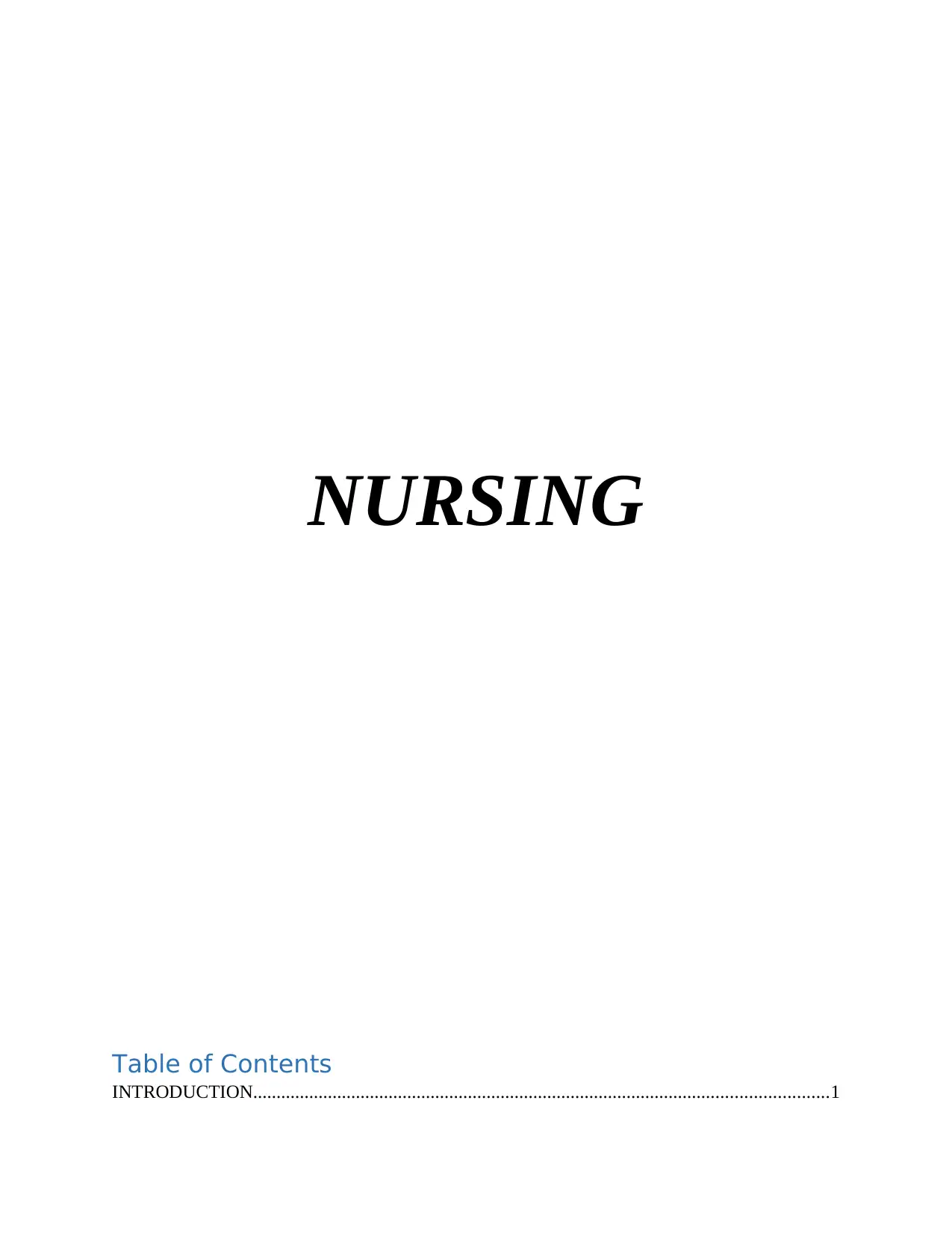
NURSING
Table of Contents
INTRODUCTION...........................................................................................................................1
Table of Contents
INTRODUCTION...........................................................................................................................1
Paraphrase This Document
Need a fresh take? Get an instant paraphrase of this document with our AI Paraphraser
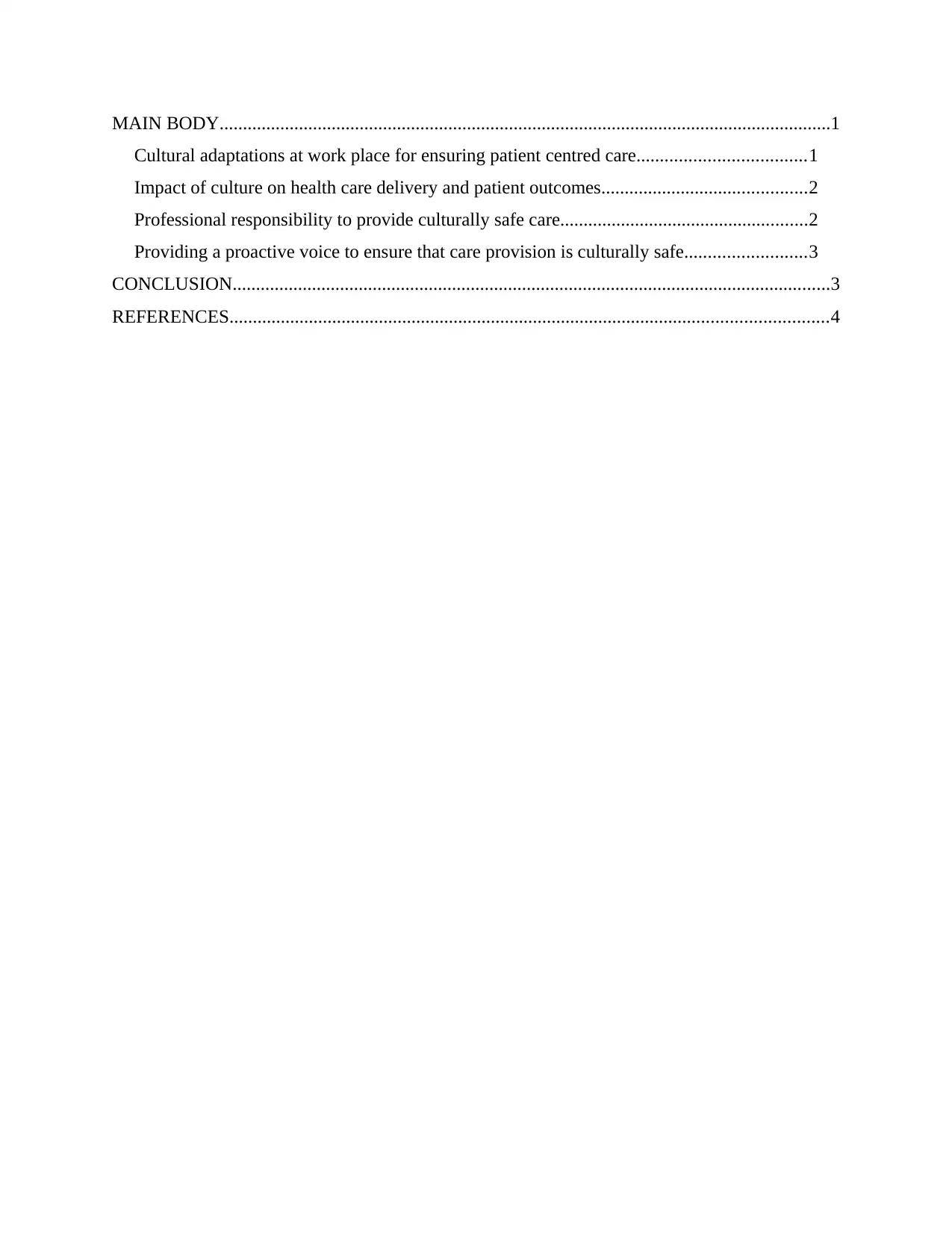
MAIN BODY...................................................................................................................................1
Cultural adaptations at work place for ensuring patient centred care....................................1
Impact of culture on health care delivery and patient outcomes............................................2
Professional responsibility to provide culturally safe care.....................................................2
Providing a proactive voice to ensure that care provision is culturally safe..........................3
CONCLUSION................................................................................................................................3
REFERENCES................................................................................................................................4
Cultural adaptations at work place for ensuring patient centred care....................................1
Impact of culture on health care delivery and patient outcomes............................................2
Professional responsibility to provide culturally safe care.....................................................2
Providing a proactive voice to ensure that care provision is culturally safe..........................3
CONCLUSION................................................................................................................................3
REFERENCES................................................................................................................................4

⊘ This is a preview!⊘
Do you want full access?
Subscribe today to unlock all pages.

Trusted by 1+ million students worldwide
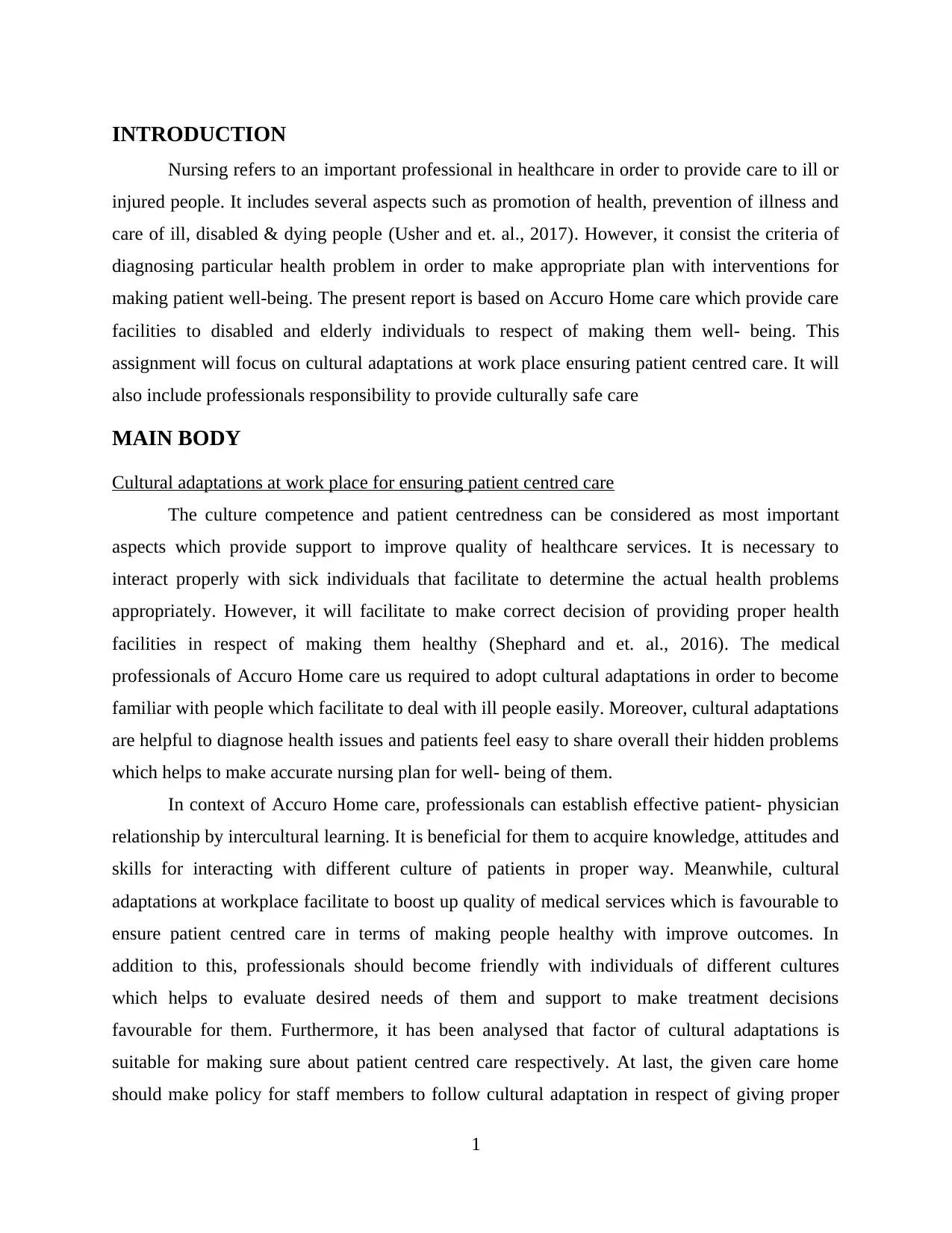
INTRODUCTION
Nursing refers to an important professional in healthcare in order to provide care to ill or
injured people. It includes several aspects such as promotion of health, prevention of illness and
care of ill, disabled & dying people (Usher and et. al., 2017). However, it consist the criteria of
diagnosing particular health problem in order to make appropriate plan with interventions for
making patient well-being. The present report is based on Accuro Home care which provide care
facilities to disabled and elderly individuals to respect of making them well- being. This
assignment will focus on cultural adaptations at work place ensuring patient centred care. It will
also include professionals responsibility to provide culturally safe care
MAIN BODY
Cultural adaptations at work place for ensuring patient centred care
The culture competence and patient centredness can be considered as most important
aspects which provide support to improve quality of healthcare services. It is necessary to
interact properly with sick individuals that facilitate to determine the actual health problems
appropriately. However, it will facilitate to make correct decision of providing proper health
facilities in respect of making them healthy (Shephard and et. al., 2016). The medical
professionals of Accuro Home care us required to adopt cultural adaptations in order to become
familiar with people which facilitate to deal with ill people easily. Moreover, cultural adaptations
are helpful to diagnose health issues and patients feel easy to share overall their hidden problems
which helps to make accurate nursing plan for well- being of them.
In context of Accuro Home care, professionals can establish effective patient- physician
relationship by intercultural learning. It is beneficial for them to acquire knowledge, attitudes and
skills for interacting with different culture of patients in proper way. Meanwhile, cultural
adaptations at workplace facilitate to boost up quality of medical services which is favourable to
ensure patient centred care in terms of making people healthy with improve outcomes. In
addition to this, professionals should become friendly with individuals of different cultures
which helps to evaluate desired needs of them and support to make treatment decisions
favourable for them. Furthermore, it has been analysed that factor of cultural adaptations is
suitable for making sure about patient centred care respectively. At last, the given care home
should make policy for staff members to follow cultural adaptation in respect of giving proper
1
Nursing refers to an important professional in healthcare in order to provide care to ill or
injured people. It includes several aspects such as promotion of health, prevention of illness and
care of ill, disabled & dying people (Usher and et. al., 2017). However, it consist the criteria of
diagnosing particular health problem in order to make appropriate plan with interventions for
making patient well-being. The present report is based on Accuro Home care which provide care
facilities to disabled and elderly individuals to respect of making them well- being. This
assignment will focus on cultural adaptations at work place ensuring patient centred care. It will
also include professionals responsibility to provide culturally safe care
MAIN BODY
Cultural adaptations at work place for ensuring patient centred care
The culture competence and patient centredness can be considered as most important
aspects which provide support to improve quality of healthcare services. It is necessary to
interact properly with sick individuals that facilitate to determine the actual health problems
appropriately. However, it will facilitate to make correct decision of providing proper health
facilities in respect of making them healthy (Shephard and et. al., 2016). The medical
professionals of Accuro Home care us required to adopt cultural adaptations in order to become
familiar with people which facilitate to deal with ill people easily. Moreover, cultural adaptations
are helpful to diagnose health issues and patients feel easy to share overall their hidden problems
which helps to make accurate nursing plan for well- being of them.
In context of Accuro Home care, professionals can establish effective patient- physician
relationship by intercultural learning. It is beneficial for them to acquire knowledge, attitudes and
skills for interacting with different culture of patients in proper way. Meanwhile, cultural
adaptations at workplace facilitate to boost up quality of medical services which is favourable to
ensure patient centred care in terms of making people healthy with improve outcomes. In
addition to this, professionals should become friendly with individuals of different cultures
which helps to evaluate desired needs of them and support to make treatment decisions
favourable for them. Furthermore, it has been analysed that factor of cultural adaptations is
suitable for making sure about patient centred care respectively. At last, the given care home
should make policy for staff members to follow cultural adaptation in respect of giving proper
1
Paraphrase This Document
Need a fresh take? Get an instant paraphrase of this document with our AI Paraphraser
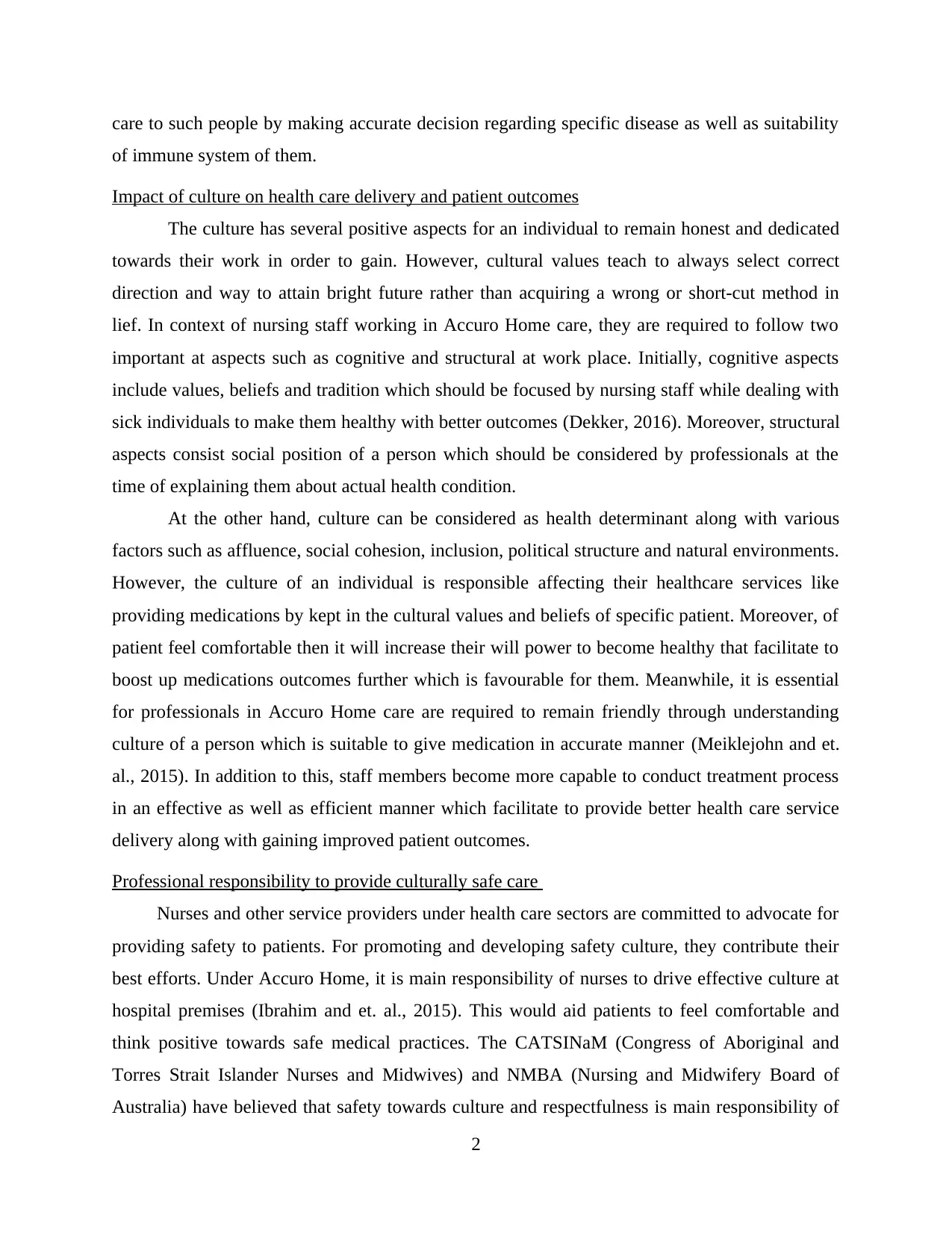
care to such people by making accurate decision regarding specific disease as well as suitability
of immune system of them.
Impact of culture on health care delivery and patient outcomes
The culture has several positive aspects for an individual to remain honest and dedicated
towards their work in order to gain. However, cultural values teach to always select correct
direction and way to attain bright future rather than acquiring a wrong or short-cut method in
lief. In context of nursing staff working in Accuro Home care, they are required to follow two
important at aspects such as cognitive and structural at work place. Initially, cognitive aspects
include values, beliefs and tradition which should be focused by nursing staff while dealing with
sick individuals to make them healthy with better outcomes (Dekker, 2016). Moreover, structural
aspects consist social position of a person which should be considered by professionals at the
time of explaining them about actual health condition.
At the other hand, culture can be considered as health determinant along with various
factors such as affluence, social cohesion, inclusion, political structure and natural environments.
However, the culture of an individual is responsible affecting their healthcare services like
providing medications by kept in the cultural values and beliefs of specific patient. Moreover, of
patient feel comfortable then it will increase their will power to become healthy that facilitate to
boost up medications outcomes further which is favourable for them. Meanwhile, it is essential
for professionals in Accuro Home care are required to remain friendly through understanding
culture of a person which is suitable to give medication in accurate manner (Meiklejohn and et.
al., 2015). In addition to this, staff members become more capable to conduct treatment process
in an effective as well as efficient manner which facilitate to provide better health care service
delivery along with gaining improved patient outcomes.
Professional responsibility to provide culturally safe care
Nurses and other service providers under health care sectors are committed to advocate for
providing safety to patients. For promoting and developing safety culture, they contribute their
best efforts. Under Accuro Home, it is main responsibility of nurses to drive effective culture at
hospital premises (Ibrahim and et. al., 2015). This would aid patients to feel comfortable and
think positive towards safe medical practices. The CATSINaM (Congress of Aboriginal and
Torres Strait Islander Nurses and Midwives) and NMBA (Nursing and Midwifery Board of
Australia) have believed that safety towards culture and respectfulness is main responsibility of
2
of immune system of them.
Impact of culture on health care delivery and patient outcomes
The culture has several positive aspects for an individual to remain honest and dedicated
towards their work in order to gain. However, cultural values teach to always select correct
direction and way to attain bright future rather than acquiring a wrong or short-cut method in
lief. In context of nursing staff working in Accuro Home care, they are required to follow two
important at aspects such as cognitive and structural at work place. Initially, cognitive aspects
include values, beliefs and tradition which should be focused by nursing staff while dealing with
sick individuals to make them healthy with better outcomes (Dekker, 2016). Moreover, structural
aspects consist social position of a person which should be considered by professionals at the
time of explaining them about actual health condition.
At the other hand, culture can be considered as health determinant along with various
factors such as affluence, social cohesion, inclusion, political structure and natural environments.
However, the culture of an individual is responsible affecting their healthcare services like
providing medications by kept in the cultural values and beliefs of specific patient. Moreover, of
patient feel comfortable then it will increase their will power to become healthy that facilitate to
boost up medications outcomes further which is favourable for them. Meanwhile, it is essential
for professionals in Accuro Home care are required to remain friendly through understanding
culture of a person which is suitable to give medication in accurate manner (Meiklejohn and et.
al., 2015). In addition to this, staff members become more capable to conduct treatment process
in an effective as well as efficient manner which facilitate to provide better health care service
delivery along with gaining improved patient outcomes.
Professional responsibility to provide culturally safe care
Nurses and other service providers under health care sectors are committed to advocate for
providing safety to patients. For promoting and developing safety culture, they contribute their
best efforts. Under Accuro Home, it is main responsibility of nurses to drive effective culture at
hospital premises (Ibrahim and et. al., 2015). This would aid patients to feel comfortable and
think positive towards safe medical practices. The CATSINaM (Congress of Aboriginal and
Torres Strait Islander Nurses and Midwives) and NMBA (Nursing and Midwifery Board of
Australia) have believed that safety towards culture and respectfulness is main responsibility of
2
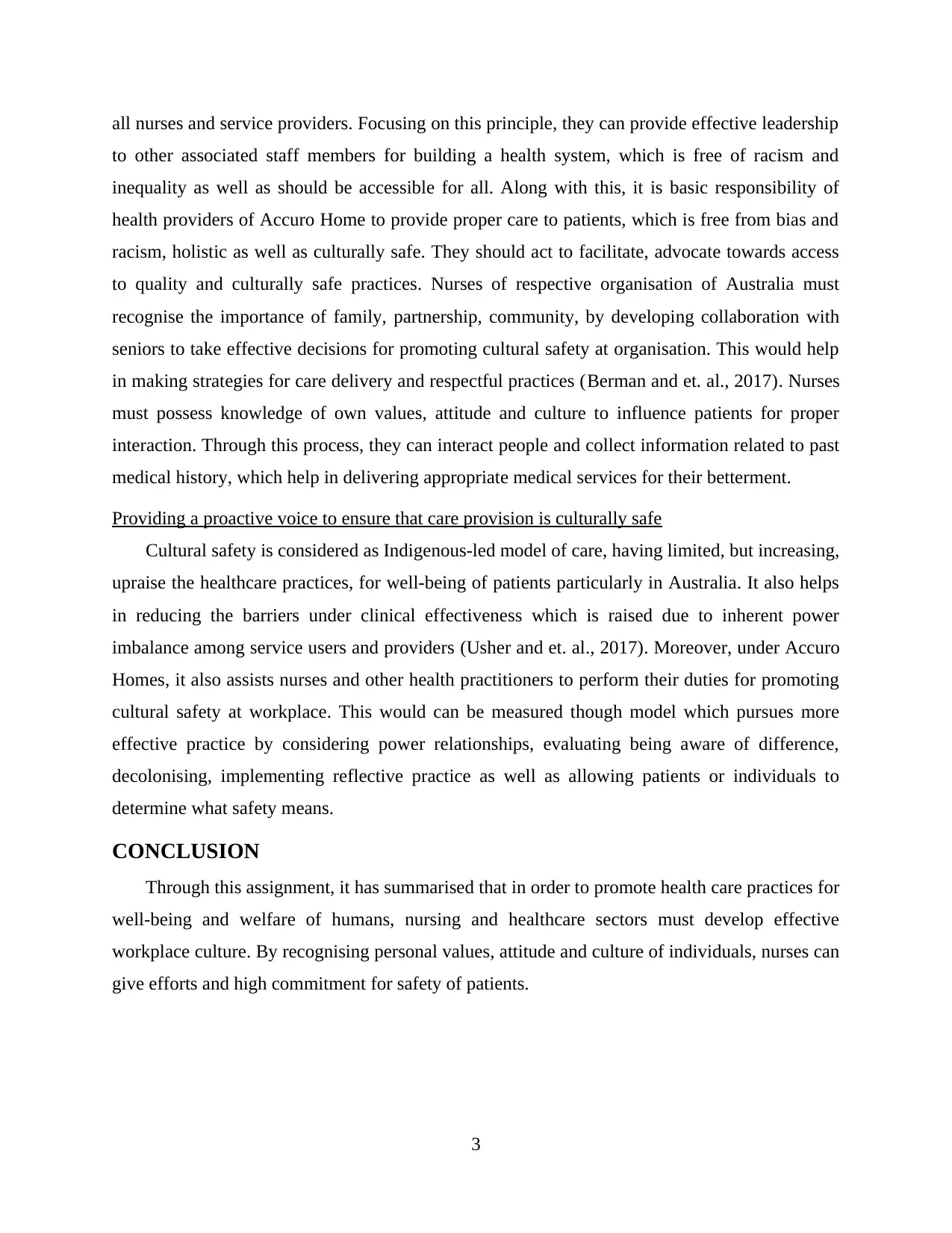
all nurses and service providers. Focusing on this principle, they can provide effective leadership
to other associated staff members for building a health system, which is free of racism and
inequality as well as should be accessible for all. Along with this, it is basic responsibility of
health providers of Accuro Home to provide proper care to patients, which is free from bias and
racism, holistic as well as culturally safe. They should act to facilitate, advocate towards access
to quality and culturally safe practices. Nurses of respective organisation of Australia must
recognise the importance of family, partnership, community, by developing collaboration with
seniors to take effective decisions for promoting cultural safety at organisation. This would help
in making strategies for care delivery and respectful practices (Berman and et. al., 2017). Nurses
must possess knowledge of own values, attitude and culture to influence patients for proper
interaction. Through this process, they can interact people and collect information related to past
medical history, which help in delivering appropriate medical services for their betterment.
Providing a proactive voice to ensure that care provision is culturally safe
Cultural safety is considered as Indigenous-led model of care, having limited, but increasing,
upraise the healthcare practices, for well-being of patients particularly in Australia. It also helps
in reducing the barriers under clinical effectiveness which is raised due to inherent power
imbalance among service users and providers (Usher and et. al., 2017). Moreover, under Accuro
Homes, it also assists nurses and other health practitioners to perform their duties for promoting
cultural safety at workplace. This would can be measured though model which pursues more
effective practice by considering power relationships, evaluating being aware of difference,
decolonising, implementing reflective practice as well as allowing patients or individuals to
determine what safety means.
CONCLUSION
Through this assignment, it has summarised that in order to promote health care practices for
well-being and welfare of humans, nursing and healthcare sectors must develop effective
workplace culture. By recognising personal values, attitude and culture of individuals, nurses can
give efforts and high commitment for safety of patients.
3
to other associated staff members for building a health system, which is free of racism and
inequality as well as should be accessible for all. Along with this, it is basic responsibility of
health providers of Accuro Home to provide proper care to patients, which is free from bias and
racism, holistic as well as culturally safe. They should act to facilitate, advocate towards access
to quality and culturally safe practices. Nurses of respective organisation of Australia must
recognise the importance of family, partnership, community, by developing collaboration with
seniors to take effective decisions for promoting cultural safety at organisation. This would help
in making strategies for care delivery and respectful practices (Berman and et. al., 2017). Nurses
must possess knowledge of own values, attitude and culture to influence patients for proper
interaction. Through this process, they can interact people and collect information related to past
medical history, which help in delivering appropriate medical services for their betterment.
Providing a proactive voice to ensure that care provision is culturally safe
Cultural safety is considered as Indigenous-led model of care, having limited, but increasing,
upraise the healthcare practices, for well-being of patients particularly in Australia. It also helps
in reducing the barriers under clinical effectiveness which is raised due to inherent power
imbalance among service users and providers (Usher and et. al., 2017). Moreover, under Accuro
Homes, it also assists nurses and other health practitioners to perform their duties for promoting
cultural safety at workplace. This would can be measured though model which pursues more
effective practice by considering power relationships, evaluating being aware of difference,
decolonising, implementing reflective practice as well as allowing patients or individuals to
determine what safety means.
CONCLUSION
Through this assignment, it has summarised that in order to promote health care practices for
well-being and welfare of humans, nursing and healthcare sectors must develop effective
workplace culture. By recognising personal values, attitude and culture of individuals, nurses can
give efforts and high commitment for safety of patients.
3
⊘ This is a preview!⊘
Do you want full access?
Subscribe today to unlock all pages.

Trusted by 1+ million students worldwide
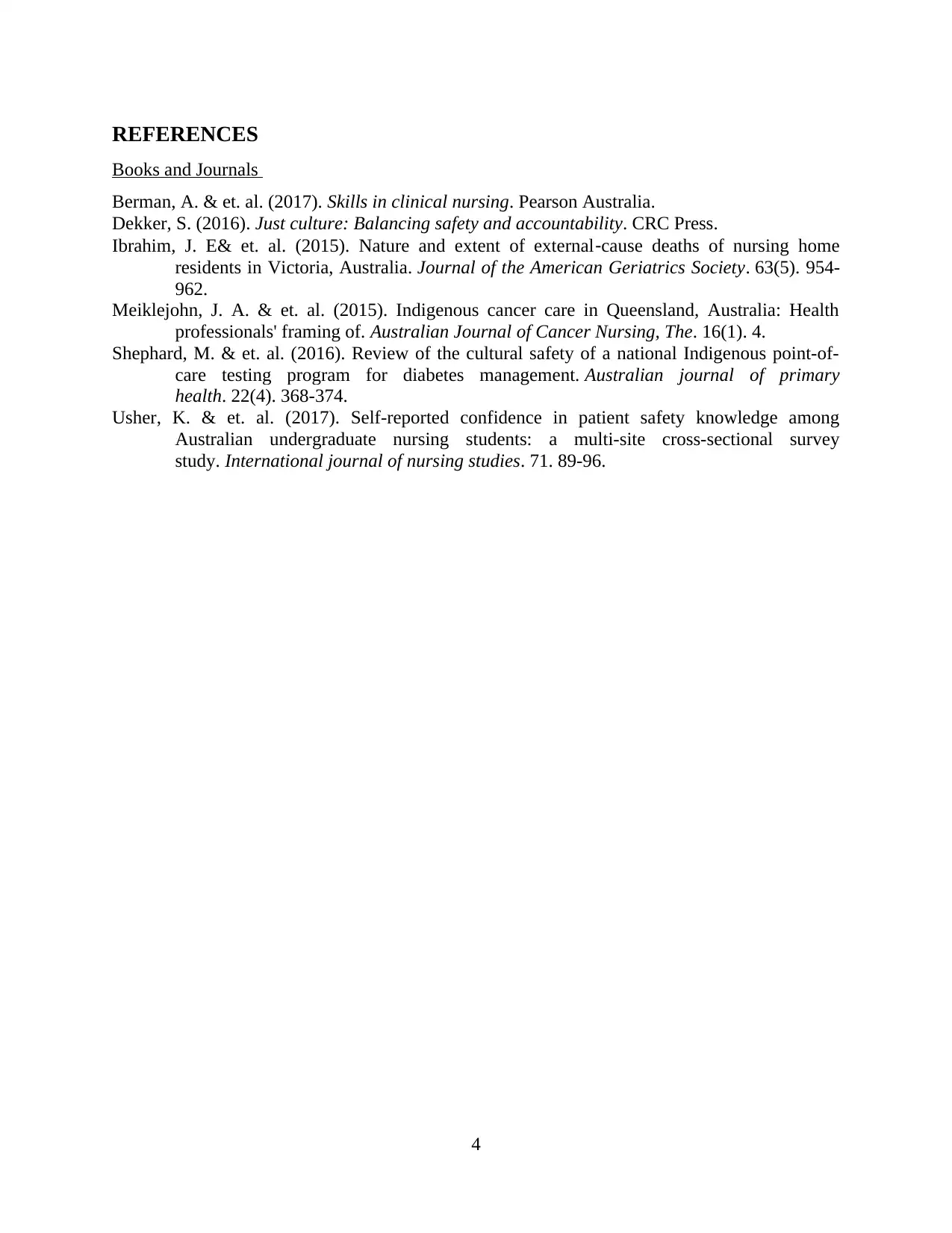
REFERENCES
Books and Journals
Berman, A. & et. al. (2017). Skills in clinical nursing. Pearson Australia.
Dekker, S. (2016). Just culture: Balancing safety and accountability. CRC Press.
Ibrahim, J. E& et. al. (2015). Nature and extent of external‐cause deaths of nursing home
residents in Victoria, Australia. Journal of the American Geriatrics Society. 63(5). 954-
962.
Meiklejohn, J. A. & et. al. (2015). Indigenous cancer care in Queensland, Australia: Health
professionals' framing of. Australian Journal of Cancer Nursing, The. 16(1). 4.
Shephard, M. & et. al. (2016). Review of the cultural safety of a national Indigenous point-of-
care testing program for diabetes management. Australian journal of primary
health. 22(4). 368-374.
Usher, K. & et. al. (2017). Self-reported confidence in patient safety knowledge among
Australian undergraduate nursing students: a multi-site cross-sectional survey
study. International journal of nursing studies. 71. 89-96.
4
Books and Journals
Berman, A. & et. al. (2017). Skills in clinical nursing. Pearson Australia.
Dekker, S. (2016). Just culture: Balancing safety and accountability. CRC Press.
Ibrahim, J. E& et. al. (2015). Nature and extent of external‐cause deaths of nursing home
residents in Victoria, Australia. Journal of the American Geriatrics Society. 63(5). 954-
962.
Meiklejohn, J. A. & et. al. (2015). Indigenous cancer care in Queensland, Australia: Health
professionals' framing of. Australian Journal of Cancer Nursing, The. 16(1). 4.
Shephard, M. & et. al. (2016). Review of the cultural safety of a national Indigenous point-of-
care testing program for diabetes management. Australian journal of primary
health. 22(4). 368-374.
Usher, K. & et. al. (2017). Self-reported confidence in patient safety knowledge among
Australian undergraduate nursing students: a multi-site cross-sectional survey
study. International journal of nursing studies. 71. 89-96.
4
1 out of 7
Related Documents
Your All-in-One AI-Powered Toolkit for Academic Success.
+13062052269
info@desklib.com
Available 24*7 on WhatsApp / Email
![[object Object]](/_next/static/media/star-bottom.7253800d.svg)
Unlock your academic potential
Copyright © 2020–2025 A2Z Services. All Rights Reserved. Developed and managed by ZUCOL.





